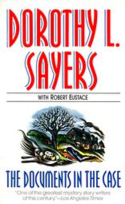 From the back cover:
From the back cover:
The grotesquely grinning corpse in the Devonshire shack was of a man who had died horribly—with a dish of mushrooms at his side. His body contained enough death-dealing muscarine to kill thirty people. Why would an expert on fungi feast on a large quantity of this particularly poisonous species? A clue to the brilliant murderer, who had baffled the best minds in London, was hidden in a series of letters and documents that no one seemed to care about, except the dead man’s son.
Review:
The Documents in the Case is the one full-length mystery novel penned by Dorothy L. Sayers that doesn’t star Lord Peter Wimsey. Before I’d read it, I knew of it merely as “the one with the mushrooms.” Now I’ll know it as “the really boring one with the mushrooms.”
For the most part, this is an epistolary novel in which letters written by the residents of a particular Bayswater address depict the state of family life before the death of patriarch and mushroom enthusiast, George Harrison (yes, really). Sayers expertly and efficiently depicts the character of each correspondent through their writing, including George himself; the young, flighty, and discontented lady of the house (Margaret); her deluded-to-the-point-of-insanity companion (Miss Milsom); the dashing artist tenant (Harwood Lathom); the deep-thought-having novelist tenant (John Munting); and George’s son from an earlier marriage (Paul), who has gathered the documents together in a bid to prove that his father was too much of an expert on mushrooms to have died from accidentally ingesting a poisonous variety.
Some of this is fairly interesting, some is irritating—seriously, although one can sympathize with Margaret for her repressive husband, she is still frequently too insincere and manipulative to bear—and some is downright tedious. Munting’s letters to his fiancée often lapse into pseudo-philosophizing, but the cake is taken by an extremely long and self-indulgent scene near the end in which Sayers uses a bunch of random professorial types as mouthpieces through which to espouse some theories on the origins of life. If I had a paper copy instead of an audiobook I would quote some of the dialogue from this section, but it will have to suffice it to say that my impatience caused me to hurl profanities at my innocent cassette player.
Eventually, this rambling conversation produces the means of proving the death was no accident, and then there’s a very brief postscript about how the culprit was hanged. The end.
Ultimately, I conclude that this one is only for completists. Completists, I wish I could say this was better, but perhaps it will be some small comfort to know that it is at least quite short.




Hmm. It’s been a while since I read this, but I recall liking it pretty well. Maybe because it was a straight up mystery and sometimes Sayers has a tendency to get far too ‘literary’ for my tastes.
It is straightforward, except when going off on tangents like I mentioned above. Maybe that’s why they rankled more, actually… they just seemed tonally out-of-place with the rest of the narrative. I do grant, however, that I am not keen on science so my eyes might’ve glazed over more than an ordinary person’s would have.